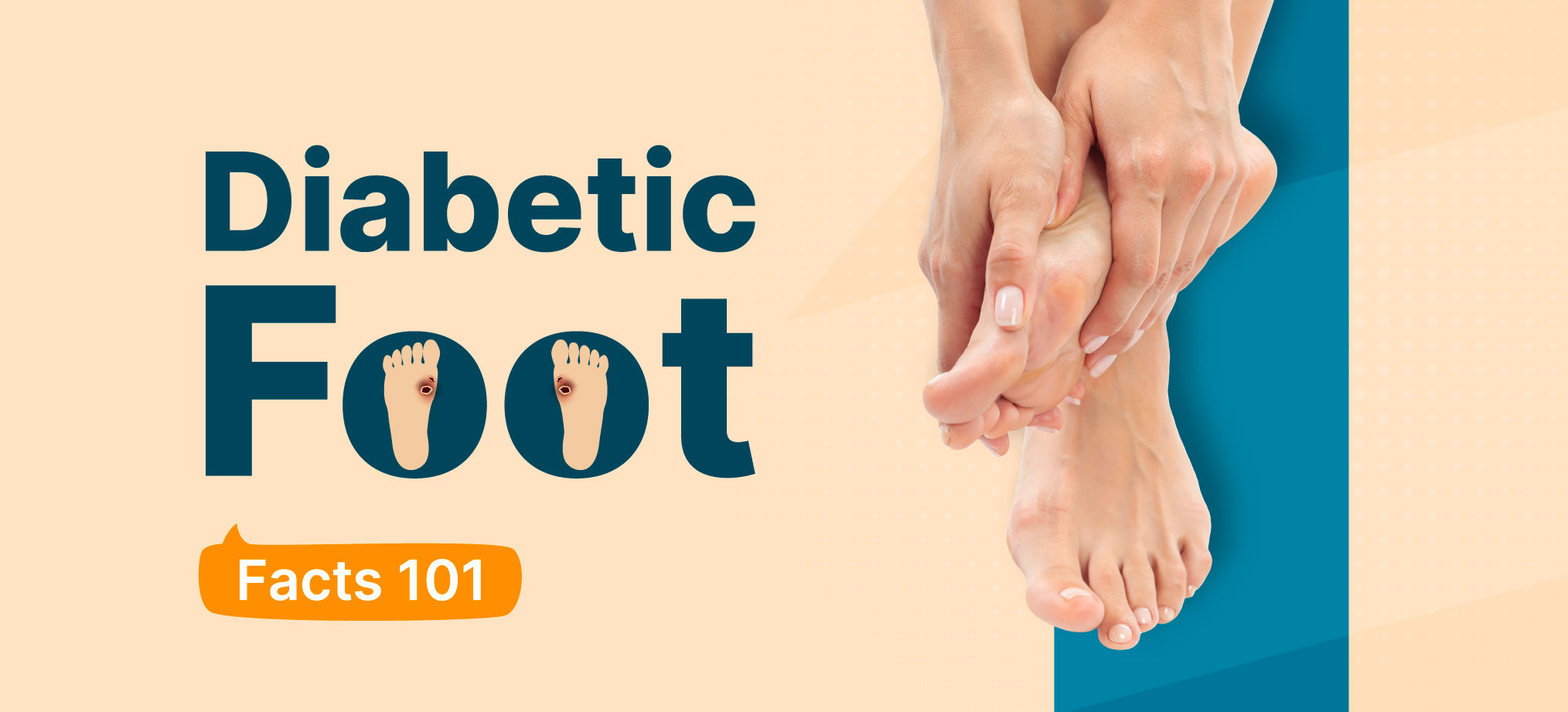Diabetes Management
Vision Troubles in Diabetes: Diagnosis and Treatment
3 min read

Although diabetes primarily impacts blood sugar regulation, it also has an impact on multiple organs of the body, including the eyes. Individuals suffering from diabetes-related vision problems should keep a close watch on the symptoms and get in touch with their healthcare provider. In this blog, we will explore the diagnosis and treatment of vision issues associated with diabetes.
Diagnosis
Early diagnosis is the key to preventing vision troubles caused by diabetes. Here are a few tests that can help you diagnose eye diseases:
- Comprehensive Eye Exam: Regular consultation with an optometrist or ophthalmologist for a comprehensive eye exam is essential for the early detection of diabetic eye diseases. The check-up may range from asking you to identify letters on an eye chart to complex tests like using digital imaging devices to see and evaluate tiny blood vessels or dilating the pupils to get a clear view of the retina.
- Retinal Imaging: Advanced tools such as retinal imaging and optical coherence tomography (OCT) are used to obtain detailed images of the retina. This allows healthcare professionals to identify abnormalities, such as diabetic retinopathy.
- Visual Acuity Testing: A standard eye chart is used to assess visual acuity, where the healthcare provider measures the ability of the eye to differentiate shapes and details of objects at a given distance. Changes in visual acuity may indicate diabetic eye complications like macular edema (swelling in a part of the retina).
- Tonometry: This test measures the pressure inside the eyes (intraocular pressure). It is essential for detecting glaucoma, a condition that damages the optic nerve.
Treatment
Treatment of eye diseases depends on the severity of the condition. A few treatment options opted by healthcare professionals are mentioned below:
- Blood Sugar Control: Maintaining stable blood sugar levels is crucial for preventing and managing diabetes-related vision problems. Your endocrinologist or healthcare provider can help you develop a personalised diabetes management plan.
- Medications: Depending on the specific eye condition, medications such as anti-vascular endothelial growth factor injections or steroids may be prescribed to reduce swelling, control blood vessel growth, and manage inflammation.
- Laser Therapy: Laser treatments, like photocoagulation and panretinal photocoagulation, are used to seal or shrink abnormal blood vessels in diabetic retinopathy. It can help prevent further vision loss.
- Surgery: In advanced cases, surgical interventions like vitrectomy may be necessary to remove scar tissue or blood from the eye.
- Lifestyle Modifications: Adopting a healthy lifestyle can significantly impact diabetes management and eye health. This includes regular exercise, a balanced diet, avoiding smoking, and controlling blood pressure and cholesterol levels.
Conclusion
Diabetes-related vision troubles are a significant concern. Although, with early diagnosis and appropriate treatment, many complications can be managed or even prevented. Regular eye examinations and proactive diabetes management are essential for preserving vision and overall eye health for individuals living with diabetes.
Diabetes Management
Leave Comment
Recommended for you

Diabetes Management
Can Diabetes Affect Your Recovery?
Diabetes can influence the recovery process, causing delayed healing, heightened infection risks, and surgical complications due to impaired blood circulation and immune function. Additionally, neuropathy can complicate pain management, and diabetes-related comorbidities can extend recovery times. Effective diabetes management, including blood sugar control and a healthy lifestyle, is essential for improving recovery outcomes. Elevated blood sugar levels in diabetes affect the body's natural healing mechanisms by limiting nutrient and oxygen flow, hindering the immune system, and promoting inflammation within cells.

Diabetes Management
Prevention Tips For Diabetes Foot Infection
In case of uncontrolled diabetes, high blood sugar levels can damage the blood vessels and nerves, resulting in poor blood circulation. This can increase the risk of foot ulcers and infections. The reduced blood flow and loss of sensation in the feet can make it difficult to detect injuries or infections, leading to delayed healing and potential complications.

Diabetes Management
Genetic Testing May Help Determine the Cause for Type 1 Diabetes
Type 1 diabetes is an autoimmune disorder where the immune system attacks and destroys insulin-producing beta cells in the pancreas. A recent study suggests a specific dysfunction in exocrine cells of the pancreas may play a role in the development of type 1 diabetes. This finding expands our understanding of the disease and could potentially lead to new treatment approaches.
Subscribe
Sign up for our free Health Library Daily Newsletter
Get doctor-approved health tips, news, and more.
Visual Stories

8 Fruits That are Incredibly Healthy for Diabetes
Tap to continue exploring
Recommended for you

Diabetes Management
Can Diabetes Affect Your Recovery?
Diabetes can influence the recovery process, causing delayed healing, heightened infection risks, and surgical complications due to impaired blood circulation and immune function. Additionally, neuropathy can complicate pain management, and diabetes-related comorbidities can extend recovery times. Effective diabetes management, including blood sugar control and a healthy lifestyle, is essential for improving recovery outcomes. Elevated blood sugar levels in diabetes affect the body's natural healing mechanisms by limiting nutrient and oxygen flow, hindering the immune system, and promoting inflammation within cells.

Diabetes Management
Prevention Tips For Diabetes Foot Infection
In case of uncontrolled diabetes, high blood sugar levels can damage the blood vessels and nerves, resulting in poor blood circulation. This can increase the risk of foot ulcers and infections. The reduced blood flow and loss of sensation in the feet can make it difficult to detect injuries or infections, leading to delayed healing and potential complications.

Diabetes Management
Genetic Testing May Help Determine the Cause for Type 1 Diabetes
Type 1 diabetes is an autoimmune disorder where the immune system attacks and destroys insulin-producing beta cells in the pancreas. A recent study suggests a specific dysfunction in exocrine cells of the pancreas may play a role in the development of type 1 diabetes. This finding expands our understanding of the disease and could potentially lead to new treatment approaches.